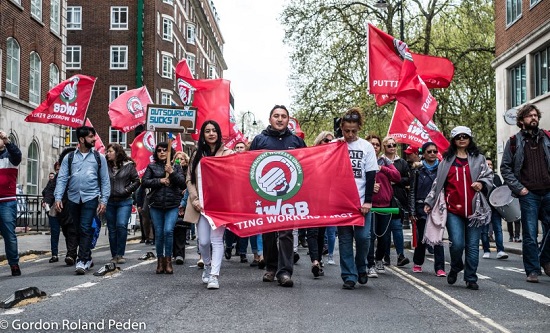
On 25 and 26 April 2018, workers from the Independent Workers Union of Great Britain (IWGB) in the University of London (UoL) went on strike against the outsourcing of contracts which harms working conditions. The IWGB’s president, Henry Chango-Lopez, called it ‘the biggest-ever strike of outsourced workers in UK higher education history’. Over 100 low-paid, outsourced workers from the Senate House participated. The rally on 25 April attracted hundreds of workers, students and other supporters. With further strike action threatened, the University of London management announced on 24 May that it would begin a process to end outsourcing and bring facilities and management contracts back in-house, a major step towards victory for the IWGB campaign. Nonetheless, workers are holding the management to their word and will go ahead with strike action planned for 6 June. Elias Haddad reports.
Since forming in 2012 as a breakaway group from the cleaners’ branch of International Workers of the World union, the IWGB has been organising casualised and precarious workers, who are often migrants and treated with the utmost contempt by employers. They are involved in the campaign by Deliveroo riders to be legally considered as ‘workers’ instead of ‘self-employed contractors’. Under the latter category, Deliveroo riders are not entitled to basic rights such as sick pay, holiday pay or the national minimum wage. In November 2017 the British courts ruled in favour of the company, but the struggle continues (See FRFI 253). Other fights have already proved successful, however. In May 2018, the IWGB won an appeal against private-hire car company Addison Lee, over whether a worker was an ‘independent contractor’ or an employee.
IWGB’s campaigning at the University of London has been launched against a background of deteriorating conditions in the higher education sector. In England and Wales, British and European Union students’ annual fees rose from £3,000 in 2005 to £9,250 in 2017. At the same time, however, British universities have been pushing severe austerity policies on their staff. From February to April lecturers, researchers, teacher assistants and support staff from across Britain went on strike over a proposal to end guaranteed pensions (see FRFI 263). By 2016 53% of Britain’s academic staff was on temporary, zero-hours or other atypical contracts, according to The Guardian.
It is no surprise that low-paid workers would be hit hardest by universities’ austerity. The IWGB is taking action with its ‘Back In-House Campaign’ to end outsourcing of workers, abolish zero-hour contracts and ensure that the university implement the pay rises it promised in 2012. By deciding to outsource workers, the University of London was cheapening the maintenance of its buildings, at the cost of labour conditions. According to the IWGB, ‘outsourced workers receive worse pension, holiday pay, sick pay, maternity and paternity pay than their in-house colleagues’. Since their contracts are also less secure, outsourced staff are more likely to suffer from ‘bullying, discrimination and illegal deduction of wages’.
Hundreds of outsourced workers protested alongside students in January 2018, and in March IWGB announced the biggest ever strike of outsourced workers in higher education, planned for 25 and 26 April. Students occupied the University of London’s finance and management offices in Senate House for two weeks in support of the workers’ strike. As a defensive measure, the university’s management reinforced security measures at Senate House, erecting tall, opaque fences around the building and reducing the number of entrances. The strikers were unperturbed and rallied outside Senate House on 25 April, before marching and blocking traffic around Russell Square. With the University still denying the IWGB union a voice in the review process, further strike action was called for June.
In a major concession, on 24 May UoL announced it would begin the process to bring workers back in-house. This is a clear victory for the workers, but key questions and demands have not yet been answered, so the fight will go on. UoL has failed to specify which services will be brought in-house, nor have they given a timescale for the process. The IWGB responded: ‘The vagueness of the statement and the lack of clarity on both the timeline and on which contracts will be brought in house means the IWGB will go ahead with the strike of around 130 outsourced cleaners, security officers, receptionists, porters, post room workers and audiovisual workers, scheduled for 6 June.’ Victory to the strikers!
A protest in support of the strike has been called for 6 June from 5.30pm at University of London, Russell Square, WC1E 7HU
Precarious work and attacks on living conditions are becoming the norm as the crisis of capitalism deepens. The lowest-paid workers in the service sector are becoming increasingly organised in response. Workers from Picturehouse Cinemas and McDonald’s have recently gone on strike over very basic demands, such as being paid the so-called London living wage, which is £10.20 per hour. This is because they were receiving pay equal to or only slightly over the national minimum wage, which is £7.83 per hour for adults aged 25 or over.
The struggle has been hard. In January, unionised Picturehouse workers called off their strike after their employers threatened to cut their pay beyond action hours. That means that, regardless of how many hours in a day workers went on strike, the company would not pay them for the entire day’s shift. McDonald’s workers have fought since September 2017 as bosses have ignored their demands. Nonetheless, they are making history; this is the first time that British McDonald’s workers have gone on strike in the 40 years of the company being in the UK market.




